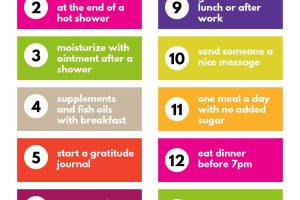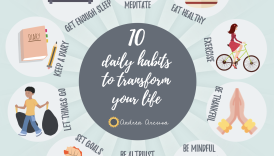The Ultimate Guide to Boosting Your Health and Wellness

Importance of Health and Wellness
In today’s fast-paced world, the importance of health and wellness cannot be overstated. Prioritizing physical health not only improves quality of life but also boosts mental well-being and emotional resilience. A balanced approach to health encourages individuals to thrive rather than just survive. For instance, someone who incorporates a healthy diet and regular exercise into their lifestyle often feels more energetic and focused. This enhanced vitality can lead to improved performance at work or school, fostering a positive cycle of achievement.
- The Ultimate Guide to Boosting Your Health and Wellness
- Importance of Health and Wellness
- Setting Goals for a Healthier Lifestyle
- Nutrition
- Balanced Diet Essentials
- Superfoods to Include in Your Diet
- Fitness
- Creating a Workout Routine
- Importance of Regular Exercise
- Mental Health
- Stress Management Techniques
- Practicing Mindfulness and Meditation
- Sleep
- Importance of Quality Sleep
- Tips for Better Sleep Habits
- Hydration
- Benefits of Staying Hydrated
- How Much Water Should You Drink Daily?
- Self-Care
- Prioritizing Self-Care Activities
- Finding Time for Self-Care in Your Routine
- Mind-Body Connection
- Understanding the Link Between Mental and Physical Health
- Holistic Approaches to Wellness
- Social Connections
- Importance of Building Relationships
- Ways to Nurture Your Social Circle
- Preventive Health Measures
- Regular Health Check-ups
- Importance of Vaccinations and Screenings
Setting Goals for a Healthier Lifestyle
Setting clear, achievable goals is fundamental to adopting a healthier lifestyle. Not only does this provide direction, but it also creates a sense of accomplishment as one progresses. Here are a few effective strategies:
- Set Specific Goals: Instead of saying “I want to be healthier,” specify “I will exercise three times a week.”
- Make Them Measurable: Track your food intake or exercise frequency to monitor progress.
- Stay Realistic: Begin with small changes; overwhelming oneself can lead to frustration.
By taking these steps, individuals can create a tailored roadmap that encourages ongoing commitment to wellness.
Nutrition
Balanced Diet Essentials
Transitioning from goal-setting in health, one of the most significant pillars of a healthier lifestyle is nutrition. A balanced diet is essential for nourishing your body and maintaining optimal health. It involves consuming a variety of foods in the right proportions to provide all necessary nutrients while supporting overall well-being. To create a balanced plate, consider the following components:
- Fruits and Vegetables: Aim for a colorful variety to maximize vitamins and minerals.
- Whole Grains: Choose brown rice, quinoa, and whole wheat bread for complex carbohydrates.
- Lean Proteins: Incorporate chicken, fish, beans, and legumes to maintain muscle health.
- Healthy Fats: Include avocados, nuts, and olive oil for heart health.
Superfoods to Include in Your Diet
In addition to these essentials, incorporating superfoods can elevate your nutrition game. These nutrient-dense foods are known for their health benefits, making them a smart addition to any diet. Some popular superfoods to consider:
- Blueberries: Packed with antioxidants that fight inflammation.
- Kale: Rich in vitamins A, K, and C, promoting overall health.
- Quinoa: A complete protein that provides all nine essential amino acids.
- Chia Seeds: High in fiber and omega-3 fatty acids, aiding digestion.
By focusing on these balanced diet essentials and integrating superfoods into meals, individuals can enjoy improved health and vitality on their wellness journey.
Fitness
Creating a Workout Routine
Building on the nutritious foundation laid previously, establishing a workout routine is an equally essential aspect of enhancing one’s health. A well-structured fitness plan not only boosts physical health but also contributes to mental clarity and emotional resilience. When creating a workout routine, consider the following steps:
- Set Specific Goals: Define what you want to achieve, whether it’s weight loss, muscle gain, or improved endurance.
- Choose Activities You Enjoy: Select exercises, such as swimming, cycling, or yoga, to make the workouts enjoyable and sustainable.
- Incorporate Variety: Mix strength training, cardiovascular activities, and flexibility exercises to keep things interesting and engage different muscle groups.
Importance of Regular Exercise
Regular exercise is paramount for maintaining good health. Personally, I’ve found that those days I engage in physical activity are often my most productive. Here are a few reasons why making exercise a routine is beneficial:
- Boosts Mood: Exercise releases endorphins that can help combat stress and anxiety.
- Improves Cardiovascular Health: Regular activity strengthens the heart and enhances circulation.
- Enhances Longevity: Research shows that consistent exercise contributes to a longer, healthier life.
By dedicating time to regular exercise and crafting a workout routine, individuals can foster improved physical health, emotional well-being, and a more vibrant lifestyle.
Mental Health
Stress Management Techniques
Following a consistent workout routine, it’s crucial not to overlook mental health, particularly stress management. Stress is a common struggle in our fast-paced lives, and effectively managing it can significantly enhance overall well-being. One technique that has worked wonders for me includes:
- Deep Breathing: Taking a few minutes to focus on your breath can ground you and help alleviate tension.
- Physical Activity: Workout sessions aren’t just for physical fitness; they release endorphins that combat stress.
- Time Management: Organizing daily tasks can help prevent feelings of being overwhelmed.
Practicing Mindfulness and Meditation
Integrating mindfulness and meditation into daily routines can deepen the impact of stress management. Here’s how to incorporate these practices effectively:
- Start Small: Begin with just five minutes of guided meditation or mindful breathing each day. Gradually increase the duration as you become more comfortable.
- Focus on the Present: During daily tasks, try to engage fully with the experience. Observe your surroundings, savor your meals, or listen closely when conversing with others.
- Use Apps: There are many apps available that offer guided sessions, making it easier to establish a habit.
Mindfulness and meditation cultivate a sense of calm and clarity, enabling individuals to navigate life’s challenges with renewed energy and resilience.
Sleep
Importance of Quality Sleep
After discussing mental health strategies, it’s essential to recognize that sleep plays a vital role in both physical and emotional well-being. Quality sleep not only rejuvenates the body but also enhances cognitive function and emotional stability. I’ve experienced firsthand how a good night’s sleep can drastically improve my focus, mood, and even productivity the next day. Here are a few key benefits of quality sleep:
- Boosts Immune Function: A well-rested body is more effective at fighting off illnesses.
- Enhances Memory: Sleep consolidates information, making it easier to recall later.
- Regulates Mood: A lack of sleep can lead to irritability and increased stress levels.
Tips for Better Sleep Habits
Improving sleep habits doesn’t have to be complicated. Here are some practical tips:
- Maintain a Consistent Sleep Schedule: Try to go to bed and wake up at the same time every day, even on weekends.
- Create a Relaxing Bedtime Routine: Engage in calming activities like reading or taking a warm bath before bed.
- Limit Screen Time: Reduce exposure to screens at least an hour before sleep, as blue light can disrupt the body’s natural sleep-wake cycle.
By prioritizing quality sleep and adopting better habits, individuals can significantly enhance their overall health and well-being, laying a solid foundation for a balanced lifestyle.
Hydration
Benefits of Staying Hydrated
Continuing the discussion on health, we cannot overlook the critical aspect of hydration. Staying hydrated is fundamental for maintaining various bodily functions. I’ve noticed that when I prioritize drinking enough water throughout the day, my energy levels soar and my concentration improves. Some notable benefits of proper hydration include:
- Enhanced Physical Performance: Water is crucial for regulating body temperature and lubricating joints.
- Improved Digestion: Adequate hydration helps in breaking down food, preventing issues like constipation.
- Boosted Skin Health: Staying hydrated can result in healthier, more radiant skin.
How Much Water Should You Drink Daily?
Now, the million-dollar question: how much water should you drink daily? While individual needs may vary based on factors like activity level and climate, a general guideline is:
- 8 x 8 Rule: Aim for eight 8-ounce glasses of water a day, which equates to about 2 liters, or half a gallon.
However, other factors to consider include:
- Exercise: Increase your intake when engaging in vigorous workouts.
- Climate: Hot or humid weather can necessitate additional hydration.
By making a conscious effort to stay hydrated, individuals can enhance their overall health and vitality, contributing to better daily functioning and well-being.
Self-Care
Prioritizing Self-Care Activities
As we wrap up our discussion on hydration, it’s time to focus on another essential aspect of well-being: self-care. In our hustle-driven society, it’s easy to neglect our own needs. Prioritizing self-care activities can significantly enhance mental and emotional health. I’ve found that dedicating time for myself has made a profound difference in my overall outlook on life. Consider incorporating these self-care activities into your routine:
- Pampering Sessions: Treat yourself to a spa day at home with baths, skincare, or relaxation techniques.
- Creative Outlets: Engage in hobbies like painting, writing, or crafting to express yourself and unwind.
- Outdoor Time: Spend time in nature, whether it’s a walk in the park or a hike in the woods, to recharge.
Finding Time for Self-Care in Your Routine
Finding time for self-care often feels challenging, but it is possible with some adjustments:
- Schedule It: Treat self-care like any other important appointment in your calendar.
- Micro Self-Care: Even short moments can refresh you. Take five minutes to stretch or breathe deeply.
- Involve Others: Engage friends or family in self-care activities, like cooking healthy meals or attending a yoga class together.
By intentionally incorporating self-care into daily life, individuals can cultivate a more balanced and fulfilling lifestyle, enhancing their ability to manage stress and enjoy life to the fullest.
Mind-Body Connection
Understanding the Link Between Mental and Physical Health
Transitioning from the topic of self-care, let’s delve into the fascinating concept of the mind-body connection. It’s a powerful reminder that our mental and physical health are intricately linked. I’ve experienced moments when stress impacted my physical well-being, leading to fatigue or even headaches. Understanding this connection can empower individuals to take a holistic approach to their health. Some key insights include:
- Stress on the Body: Chronic stress can lead to physical ailments such as high blood pressure or digestive issues.
- Mood and Immunity: Positive mental health can boost the immune system, lowering the risk of illnesses.
- Physical Activity Impact: Regular exercise not only strengthens the body but also enhances mood and reduces anxiety.
Holistic Approaches to Wellness
To foster this mind-body connection, consider embracing holistic approaches to wellness that prioritize both mental and physical health:
- Integrative Therapies: Explore options like acupuncture, massage, or chiropractic care to enhance overall well-being.
- Diet and Nutrition: Eating whole, nourishing foods can elevate mood and energy levels, creating a positive feedback loop.
- Mindfulness Practices: Incorporate yoga, tai chi, or meditation to strengthen the connection between body and mind.
By recognizing and nurturing this mind-body relationship, individuals can achieve a more balanced and fulfilling life, ultimately leading to improved health outcomes and personal well-being.
Social Connections
Importance of Building Relationships
As we move from understanding the mind-body connection, another vital pillar of wellness is the importance of social connections. Building and maintaining meaningful relationships can significantly enhance mental well-being. I’ve found that having supportive friends and family creates a safety net during challenging times, fostering resilience and joy. Research shows that strong social connections can lead to:
- Lower Stress Levels: Sharing concerns with loved ones can lighten emotional burdens.
- Improved Mental Health: Regular social interactions can reduce feelings of loneliness and depression.
- Increased Longevity: Strong relationships may contribute to longer, healthier lives.
Ways to Nurture Your Social Circle
So, how can you nurture your social circle? Here are some practical strategies:
- Schedule Regular Meet-ups: Make plans with friends or family regularly, whether it’s a coffee date or a game night.
- Engage in Group Activities: Join clubs, sports teams, or classes to meet new people with shared interests.
- Reach Out: Don’t hesitate to send a quick text or call just to check in. Small gestures can strengthen bonds over time.
By actively investing in social connections, individuals can enrich their lives with support, laughter, and love, ultimately contributing to a healthier and happier existence.
Preventive Health Measures
Regular Health Check-ups
Transitioning from the richness of social connections, we find ourselves at the critical intersection of preventive health measures. Regular health check-ups are essential for maintaining health and identifying potential issues before they become significant problems. I remember how a routine check-up led to the early detection of a health concern in my own life, emphasizing the importance of proactive care. Key reasons to prioritize regular check-ups include:
- Early Detection: Many health conditions don’t show symptoms initially. Regular check-ups can catch issues early.
- Monitoring Progress: Consistent visits allow for tracking health changes over time, creating a comprehensive health profile.
- Professional Guidance: These appointments provide the opportunity for personalized health advice and lifestyle modifications.
Importance of Vaccinations and Screenings
In addition to check-ups, vaccinations and screenings are fundamental components of preventive health. Here’s why they matter:
- Preventing Disease: Vaccines protect against serious illnesses like flu, hepatitis, and even COVID-19, ensuring public health.
- Screening Tests: Regular screenings, such as mammograms or cholesterol tests, can significantly reduce the risk of severe diseases by identifying risk factors early.
- Building Herd Immunity: A vaccinated community reduces the likelihood of disease outbreaks, supporting overall public health.
By embracing these preventive health measures, individuals can pave the way for healthier, happier lives, ultimately enjoying the benefits of well-being for years to come.





